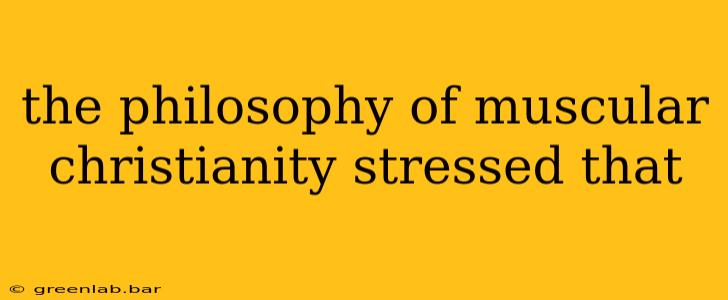Muscular Christianity, a social and religious movement prominent in the 19th century, emphasized the importance of physical strength, discipline, and manliness as essential components of Christian faith and moral character. It wasn't merely about physical fitness; it was a philosophy that intertwined athleticism with religious zeal, shaping ideals of masculinity and national identity. This philosophy stressed several key tenets:
Key Tenets of Muscular Christianity
1. The Intimate Link Between Physical and Spiritual Strength:
Muscular Christianity posited a strong correlation between physical prowess and spiritual fortitude. A healthy body, achieved through rigorous physical training and disciplined lifestyle, was seen as a vessel for a strong and virtuous spirit. Weakness of body was equated with weakness of character, and conversely, physical strength was considered a manifestation of moral strength and resilience. This concept was often expressed through the metaphor of the "strong Christian warrior," ready to face both physical and spiritual challenges.
2. Character Building Through Sport and Physical Activity:
The movement championed various sports and physical activities as vital tools for character development. Sports like rugby, cricket, and rowing were not just recreational pursuits; they were seen as arenas where essential qualities such as teamwork, perseverance, self-discipline, and fair play could be cultivated. These virtues were then considered transferable to other aspects of life, fostering responsible citizenship and moral uprightness. The emphasis was less on winning and more on the development of character through participation and competition.
3. Manliness, Masculinity, and Christian Duty:
Muscular Christianity significantly influenced the construction of masculinity during its time. It promoted an ideal of manliness characterized by physical strength, courage, and a sense of duty. This masculine ideal, however, was intertwined with Christian morality, emphasizing self-control, compassion, and a commitment to service. The "muscular Christian man" was not merely physically strong; he was also morally upright and dedicated to serving God and his country. This often manifested in missionary work, social reform, and military service.
4. Nationalism and Imperialism:
The philosophy of Muscular Christianity was often intertwined with burgeoning nationalistic and imperialist sentiments. Physical strength and discipline, promoted as integral to Christian character, were also seen as essential attributes for national greatness and imperial expansion. This connection led to the justification of colonial projects and military adventures, as a means of spreading Christianity and demonstrating national power.
5. Critique and Legacy:
While Muscular Christianity promoted positive aspects like physical well-being and character development, it also faced criticisms. Its association with aggressive nationalism and imperialism, along with its idealized and sometimes exclusionary view of masculinity, have been subjects of much scholarly debate. However, the movement's legacy is undeniable, shaping societal ideals of masculinity and influencing the development of organized sports and physical education in many parts of the world.
Conclusion:
Muscular Christianity represented a unique synthesis of religious faith, physical culture, and societal ideals. While its connection to imperialism and certain aspects of its masculine ideal are problematic in retrospect, its emphasis on character development through physical activity and its promotion of a holistic approach to well-being continue to resonate today. Understanding its philosophy offers valuable insights into the social and religious landscape of the 19th century and its lasting influence on our contemporary world.

